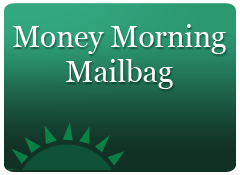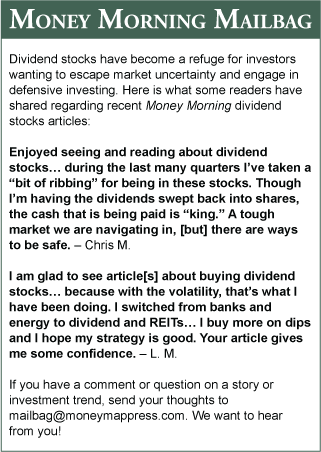Questions regarding defensive investing in uncertain times continue to fill the Money Morning Mailbag as readers aim to gain more knowledge on protective investment choices like real estate investment trusts, options-straddle strategies and dividend stocks.

In Tuesday's Money Morning article "Defensive Investing: Seven Signs Your Dividend is in Trouble," Contributing Editor Martin Hutchinson detailed how high-yield dividend stocks provide a remedy for market volatility. They generate a yield or capital gains when the market is flat or gently rising, and offer protection against a market decline.
"Dividend-paying stocks provide better long-term returns in all but the most extreme bull markets," Hutchinson said. "Build yourself a diversified portfolio of solid dividend payers and you'll be exceptionally well protected."
Companies consistently paying dividends are less likely to have dramatic share-price declines. Meanwhile, investors who go after short-term gains can be left empty-handed when the stock market reverses.

While 2009 saw hundreds of companies cut dividends by a combined total of $52 billion in the face of economic turmoil, the worst of the dividend slashing is over and investors are again on the hunt for portfolio protection in the form of dividend stocks. Hutchinson follows companies with high-yielding dividends in his "Permanent Wealth Investor" advisory service.
Readers sent in the following questions regarding companies that cut dividends and when to buy and sell dividend-paying stocks, and Hutchinson was kind enough to respond.
Question: Cherokee Inc. (Nasdaq:CHKE) cut its dividend. Shouldn't an investor want to be in companies that don't need to cut their dividends?
- Barbara R.
Hutchinson: In general, investors should want to be in companies that don't need to cut their dividends, but Cherokee's underlying business appears sound and its profits should increase rather than diminish with recovery.
The company cut its dividend early this year. It was pretty clear that nothing very serious was involved, just that their reduced earning power in the recession made the dividend too high. I'd expect earnings to recover going forward, though I imagine it will be a few quarters before the full dividend is restored.
Question: I have always noticed this, and I am surprised that investors have not picked up on it. The market always goes down when companies pay their dividends. The best time to buy a favorite stock is three to four days after it has paid out. The stock always goes down because stockholders are selling their dividend returns. What do you think?
- Valierie H.
Hutchinson: The market does indeed drop after a large dividend has been paid, because traders arbitrage the price so that it does so. However, over the following few weeks it tends to recover. The reason is that stocks are mostly valued according to their price- earnings ratios, and a stock that has just dropped 10% because of a dividend will thus look cheap compared with its peers.
So while you can't make money by buying just before a dividend and selling immediately after, you may find that the best time to buy is immediately before a dividend, while sales can be made any time two to three weeks or more after the dividend has been paid.
It's often good to buy just before a stock goes ex-dividend, but you can't reliably make money by selling immediately afterwards. However if you buy just before the dividend and sell at random times, you'll collect more than an average number of dividends, without losing significantly on capital. The arbitrage exists, but is imperfect.
[Editor's Note: Money Morning readers are often amazed by Martin Hutchinson's profit-focused instincts - as evidenced by his unerring ability to paint a picture of what's to come. He's able to show us the big profit opportunities that are still over the horizon - while also warning us about the potentially ruinous pitfalls hidden just around the corner.
So it's no surprise that Hutchinson has pulled off a string of forecasting successes in the face of the worst financial crisis since the Great Depression - a financial crisis that, not surprisingly, Hutchinson is widely credited for having predicted and warned about well ahead of time.
For those who aren't regular readers, and who might like an additional illustration of Hutchinson's abilities, consider dividends, the icon of the super-conservative investing set, and gold, the safe-haven nest of perpetual inflation hawks.
With his "Alpha Bulldog" investing strategy - the crux of his Permanent Wealth Investor advisory service - Hutchinson has managed to combine dividends, gold and growth into a winning, but low-risk formula that has developed eye-popping returns for subscribers.
To take a moment to find out more about the opportunities related to dividends, gold, "Alpha-Bulldog" stocks and The Permanent Wealth Investor, please click here. You'll likely find it time well spent.]
News and Related Links:
- Money Morning:
Defensive Investing: Seven Signs Your Dividend is in Trouble - Money Morning News Archive:
Dividend Stories - News Archives:
Defensive Investing Series - USA Today:
Companies cut dividends in '09 at a level not seen since 1930s
- Money Morning News Archive:Mailbag Items


